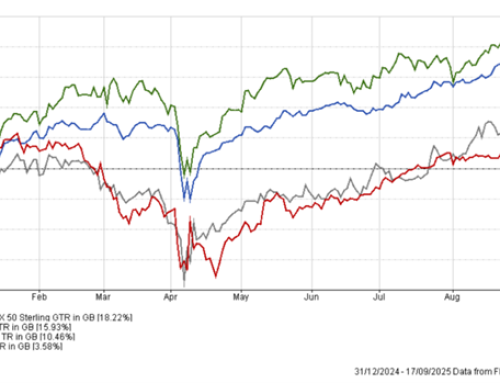Andrew’s Views
Last week was Thanksgiving weekend in the U.S. This important holiday tends to bring a gentle slowdown in activity. American markets were closed on Thursday 28th November and had a shorter trading day on Friday, allowing many investors to take a long weekend.
The week was relatively quiet for markets due to the reduced liquidity, but one pocket of excitement came from France.
France’s challenging budget deficit
French Prime Minister Michel Barnier was on the sharp end of some fairly ominous comments from Marine Le Pen, leader of the National Rally party.
France is one of the major economies with a challenging budget deficit. Arguably, it’s not much worse than the UK’s deficit, and it’s tangibly better than America’s, but the combination of political and economic factors means the challenges are particularly pressing for France right now.
The U.S. is assumed to benefit from the exorbitant privilege of hosting the world’s reserve currency. Generally speaking, this means other countries feel they must hold U.S. dollars for trade (and hold their reserves of U.S. dollars in U.S. assets, of which treasuries are the highest quality and most liquid). This means that ownership of U.S. government bonds is practically required by most countries and helps prevent yields from rising as much as they otherwise would.
Both the U.S. and the UK issue debt in their own exclusive currencies. This largely mitigates the risk of default. In extreme situations, these governments can print the money needed to pay bondholders if necessary. So, the risk for most developed countries isn’t that they can’t meet payments, but rather the consequences of doing so would be inflationary. This is why the period before the establishment of the euro saw a number of currency crises.
The Eurozone is now comprised of a group of countries that share a currency and must abide by rules to ensure the stability and efficacy of that currency. Theoretically, it means countries don’t have the option of the printing press to fall back on and would need to tighten their belts, borrow, and default on their bonds if tax revenues fall significantly short of expenditure.
In practise, that’s what has happened. Greece was forced into a painful austerity programme and bondholders suffered losses when the country found itself unable to balance its budget.
This hasn’t always been the case. Subsequent financially stressful periods have seen the European Central Bank support Eurozone bond markets in a way that, arguably, supports the weaker members at the collective expense of all. This comes at a time when the traditional powerhouses of French politics, the centre-left and centre-right, have been losing ground politically.
President Emmanuel Macron held a surprise legislative election in June and July, which saw his party lose a lot of seats. Indeed, it was only political manoeuvring (standing down the more centrist candidates to avoid splitting the vote) that prevented the more extreme parties from achieving a majority. In the absence of a clear winner, Macron’s Ensemble coalition formed a minority government with Barnier as prime minister.
Making moves to reduce borrowing
It’s from this perilous position Barnier attempts to deal with the issues of the day: a 5%+ budget deficit. France now breaks the European Union (EU)’s ‘excessive deficit’ monitoring threshold and must take steps to reduce its borrowing.
Prime Minister Barnier had promised to bring the deficit back to 5% of gross domestic product by the end of 2025, and within the 3% threshold by 2029, in accordance with ‘excessive deficit’ procedure. However, many are sceptical that he’ll be able to achieve this.
A major hindrance will be the political circumstances – while the UK government has a large majority to force through unpopular decisions, France’s minority government needs the support of its political adversaries to stay in power, a situation that seems doomed to fail.
Despite the diminished state of this government, Barnier can force through legislation without a vote. However, doing so effectively challenges his fellow lawmakers to pass a vote of no confidence in the government, effectively triggering a new election.
In negotiations so far, Barnier has conceded ground by cancelling planned increases in energy tariffs, but the National Rally party wants further concessions. This will make it harder to get back within the acceptable ranges of the demanding ‘excessive deficit’ procedure – as will the prospect of further tariffs on exports to the U.S.
Who will win in a trade spat?
Tariffs introduced by the U.S. would certainly be met by retaliatory measures from trading partners such as the EU, but a good shorthand for the eventual victor in a trade spat is to look at trade balances and determine who has most to lose.
If a country runs a trade deficit (like the U.S. is currently), it spends more on imports than it earns from exports – so if both imports and exports were subject to tariffs, the deficit country would be better off.
The U.S. generally has a trade deficit with most trading partners, which partly explains why President-elect Donald Trump is so disposed towards tariffs. However, that’s a gross over-simplification and in practice, the beneficiary of trade isn’t necessarily the party that makes the most sales.
While the revenue from tariffs, and the benefits of reduced trade, will also accrue to the biggest importers, the burden of them may still be more complicated. For example, if the goods are mobile and generic, a tariff will likely make it harder for an exporter to compete with international peers, and they will lose sales.
In contrast, if a product can’t be widely produced, is really important, and can only be obtained from a specific source, then a tariff on that source raises prices for customers with less impact on the seller.
Some goods can be considered strategically important because they are used in defence or high technology systems. A recent study found that Europe sold 32 strategically important goods to the U.S. that it would be difficult to transition away from, while the U.S. sold just eight such goods back.
It still seems safe to assume that Europe has a relatively large amount to lose from a reduction in trade, but this does show how there can be costs to all parties. This is why free trade was considered, perhaps over-simplistically, to be a positive sum game that benefits all economies (if not everyone within those economies).
Will a sharp bond sell-off affect voters?
As the week ended, the standoff amongst French politicians intensified.
French assets sold off sharply as the political crisis deepened but were relatively stable towards the end of the week. Sharp selloffs in bonds (like the UK saw after the 2022 mini budget) will likely form a material test of populists’ ability to remain popular.
Whether the financial market’s reaction to this current tension in France is significant enough to become a consideration for voters remains to be seen. If Marine Le Pen is as good as her word, the beginning of this week may prove an important moment.
Other Viewpoints
Fixed Interests – We still expect interest rates across the globe to fall over the coming years, so bonds will be set to rise as this happens, although a lot of economies are looking like they will fall slower and over a longer period of time than previously thought. A lot of the rise is already priced in to the Fixed Interest Market, but we should still see higher than normal returns over the next 3 years or so.
Global Shares – Global shares are still expected to outperform most other forms of investment over the short, medium and long term. While there is greater risk in international companies as currency risk is added on top of the usual market risk, but the potential over the longer term is significantly higher than domestic UK shares.
UK Shares – UK shares performed well over the last couple of years, but they still remain quite cheap compared to their US counterparts. Value shares, like energy and financials which dominate the UK market, are currently out of favour as investors are heading more towards growth shares, like technology companies, with this in mind we expect the UK to underperform the global benchmark going forward.
US Shares – The US market currently dominates global investment, however, US shares seem expensive and the AI companies which have driven so much growth over the last half decade, seem to have reached their peak for the time being. The dollar is also high in value, meaning a fall could wipe out values of US shares and the jobs data is less encouraging than it once was. That and the US debt level should start to worry investors at some point.
Saying that, the US has always been a good place to invest, it just might be as good as it has been in the past going forward.
European Shares – We do not expect much from the EU zone over the next few years. Political turmoil in Germany and France as well as the lack of meaningful growth stocks means we expect European shares to underperform going forward.
Asian Shares – We expect Japanese GDP to rise in terms of their own currency as the Bank of Japan increased the yield in bonds to 1%, whereas in wider Asia we expect GDP to outstrip the rest of the world by a good margin. Even with China’s stumbling growth prospects and problems with property devaluing at a significant rate, we still expect the growth to be higher than in western economies. The rest of Asia is expected to likewise do well over the next couple of years.
Emerging Markets – Once again, due to Brazil, Saudi Arabia, South Africa, Mexico and the UAE being so heavily dependant on commodities we don’t expect much upside on commodity prices so expect emerging markets to struggle for a while to come yet.


